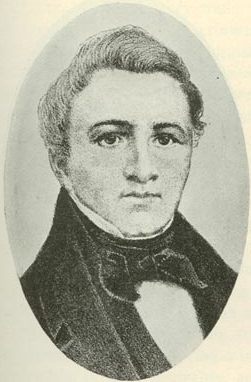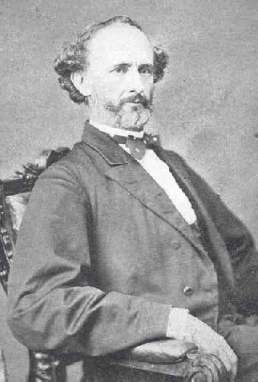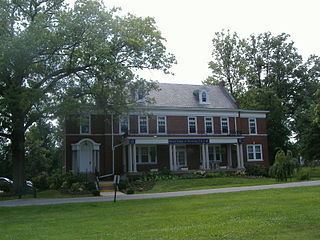The Anti-Masonic Party was the earliest third party in the United States. Formally a single-issue party, it strongly opposed Freemasonry in the United States. It was active from the late 1820s, especially in the Northeast, and later attempted to become a major party by expanding its platform to take positions on other issues. It declined quickly after 1832 as most members joined the new Whig Party; it disappeared after 1838.

Thomas Corwin, also known as Tom Corwin, The Wagon Boy, and Black Tom was a politician from the state of Ohio. He represented Ohio in both houses of Congress and served as the 15th governor of Ohio and the 20th Secretary of the Treasury. After affiliating with the Whig Party, he joined the Republican Party in the 1850s. Corwin is best known for his sponsorship of the proposed Corwin Amendment, which was presented in an unsuccessful attempt to avoid the oncoming American Civil War.
The relationship between Mormonism and Freemasonry began early in the life of Joseph Smith, founder of the Latter Day Saint movement. Smith's older brother, Hyrum, and possibly his father were Freemasons while the family lived near Palmyra, New York. In the late 1820s, the western New York region was swept with anti-Masonic fervor.

Orville Hickman Browning was an attorney in Illinois and a politician who was active in the Whig and Republican Parties. He is notable for his service as a U.S. Senator and the United States Secretary of the Interior.

Joseph Duncan was an Illinois politician. He served as the sixth Governor of Illinois from 1834 to 1838, the only Whig to ever govern the state. Before becoming governor he served four terms in the United States House of Representatives as a Democrat.

The Grand Lodge of Texas, Ancient Free and Accepted Masons is the largest of several governing bodies of Freemasonry in the State of Texas, being solely of the Ancients' tradition and descending from the Ancient Grand Lodge of England, founded on 17 June 1751 at the Turk's Head Tavern, Greek Street, Soho, London. According to historian James D. Carter, the "Grand Lodge of the Republic of Texas, A.F. & A.M." was founded on 16 April 1838. However, its first Grand Master and other grand officers were installed by Sam Houston on 11 May 1838. The Grand Lodge of Texas is one of the largest in the world, reporting 69,099 members in 2019. The current Grand Lodge of Texas facilities were made possible by the fundraising efforts of Waco Masonic Lodge No. 92.
A Masonic Temple is the conceptual ritualistic space formed when a Masonic Lodge meets, and the physical rooms and structures in which it meets. It is also used in allegorical terms to describe a philosophical goal.

Henry Pelham Holmes Bromwell was an American lawyer, politician from Illinois, and prominent Freemason. He was a lawyer and judge who served as a U.S. representative from Illinois from 1865–1869 and continued to practice law when he moved to Colorado in 1870 where he was appointed to compile the state's statutes. Bromwell was initiated into freemasonry in 1854, and he became the Grand Master of Illinois in 1864. When he moved to Colorado he became that state's first Honorary Grand Master. He developed the Free, and Accepted Architects, a new rite for Freemasonry which sought to teach its initiates the lost work of the craft embodied in Bromwell's Geometrical system. After his death, the Grand Lodge of Colorado published his work on the esoteric nature of Sacred geometry in the book Restorations of Masonic Geometry and Symbolry.

This is a chronology of the formation of "regular" or "mainstream" Masonic Grand Lodges in North America, descending from the Premier Grand Lodge of England or its rival, the Antient Grand Lodge of England. A Grand Lodge is the governing body that supervises "Craft" Freemasonry in a particular jurisdiction or geographical area.
A Research lodge is a particular type of Masonic lodge which is devoted to Masonic research. It is a lodge, and as such has a charter from some Grand Lodge. However, it does not confer degrees, and restricts membership to Master Masons of some jurisdiction in amity with the jurisdiction that the research lodge is in. Related to research lodges are Masonic research societies, which serve the same purpose but function fundamentally differently. There are research lodges in most countries where Freemasonry exists.

The Grand Lodge of Kentucky is one of two state organizations that supervise Masonic lodges in the state of Kentucky. It was established in 1800.

The Grand Lodge of Free & Accepted Masons of Indiana is one of two statewide organizations that oversee Masonic lodges in the state of Indiana. It was established on January 13, 1818. The Grand Lodge of Indiana's offices and archives are located in the Indianapolis Masonic Temple.

Archibald Williams was a United States district judge of the United States District Court for the District of Kansas. Williams was a friend and political ally of President Abraham Lincoln.
Hezekiah Lord Hosmer was a lawyer, judge, journalist, and author.

George Oliver, D.D. (1782–1867) was an English cleric, schoolmaster, topographer, and writer on freemasonry.
The history of the Jews in Illinois dates back to 1793, when John Hays, the region's first postmaster, settled in Cahokia from his native New York. The most prominent Jew in Illinois' early days was Abraham Jonas (politician), who moved to Quincy from Cincinnati in 1838. In 1842 he was elected to the Illinois Legislature, where he met Abraham Lincoln, and became his lifelong friend. Another early Jewish settler was Cap. Samuel Noah, the first Jewish graduate of West Point, who taught school at Mount Pulaski, Illinois in the late 1840s.
Albert J. Weber was a justice of the Utah Supreme Court from 1919 to 1925, and was chief justice of the Utah Supreme Court from 1923 to 1925.
George Washington Bartch was a lawyer and land speculator who served as a justice of the Utah Territorial Supreme Court from 1893 to 1894 and of the Utah Supreme Court from 1896 to 1906. He served as chief justice from 1899 to 1901 and from 1905 to 1906.
William M. McCarty was a justice of the Utah Supreme Court from 1903 to 1918.
Freemasonry in the United States is the history of Freemasonry as it was introduced from Britain and continues as a major secret society to the present day. It is a fraternal order that brings men together to gain friendship and opportunity for advancement and community progress. It has been nonpolitical except for a period around 1820 when it came under heavy attack in the Northeast. That attack reduced membership, but it recovered and grew after 1850. Growth ended in the late 20th century and membership has declined.










